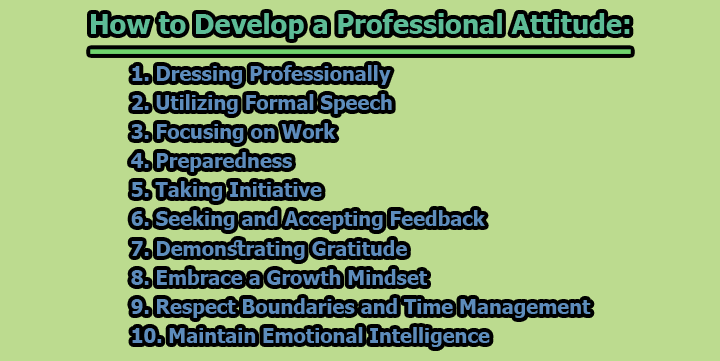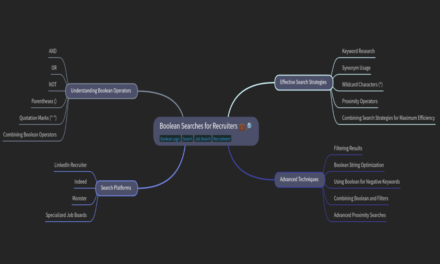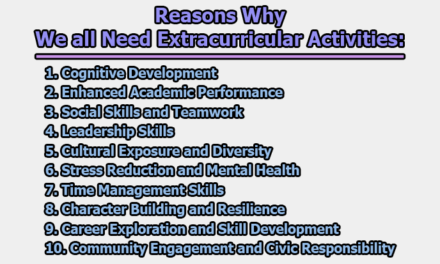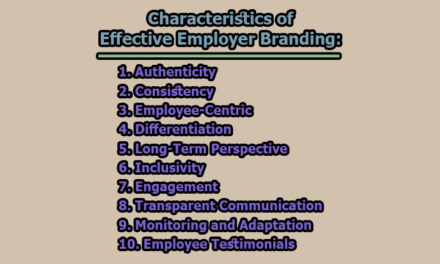In today’s fast-paced and competitive world, possessing technical expertise alone is no longer sufficient for career growth and success. A crucial aspect that sets apart high-achievers is their professional attitude. A professional attitude goes beyond mere competence and encompasses a set of behaviors, values, and traits that contribute to effective workplace interactions, career advancement, and personal growth. In this article, we explain what a professional attitude is, describe how to develop a professional attitude, and offer tips for improving your professional attitude. By incorporating these insights into your professional life, you can unlock your true potential and soar to new heights in your career.
Defining a Professional Attitude:
A professional attitude is the manifestation of a positive and proactive mindset that guides an individual’s actions, decisions, and interactions within a work environment. It involves maintaining a high level of integrity, responsibility, and respect while striving for excellence and fostering collaborative relationships with colleagues and clients.
How to Develop a Professional Attitude:
Cultivating a professional attitude is paramount for success in the workplace and other professional settings. By adhering to the following steps, individuals can elevate their demeanor and foster a positive and impactful presence:
1. Dressing Professionally: Investing in a suitable wardrobe is the first step towards projecting a professional image. The appropriateness of attire may vary depending on the industry and dress code. In formal environments like law offices, wearing suits or equivalent attire is advisable, while in less formal or labor-intensive settings, clean and functional clothing should be prioritized.
2. Utilizing Formal Speech: Communication plays a crucial role in establishing a professional attitude. To enhance professionalism in speech, individuals should adhere to proper grammar, avoid slang and offensive language, and maintain conversations focused on work-related matters rather than personal topics. Regularly employing courteous expressions such as “please” and “thank you” when engaging with colleagues and customers further reinforces a professional demeanor.
3. Focusing on Work: Devoting undivided attention to job responsibilities is a hallmark of a professional attitude. By prioritizing work tasks and supporting team members in achieving their objectives, individuals demonstrate dedication and commitment. Maintaining a clean and organized work area and consistently meeting deadlines further underscores professionalism.
4. Preparedness: Arriving at work or professional engagements well-prepared is an essential aspect of a professional attitude. Carrying essential tools such as a notebook and pen, or a laptop or tablet when needed, enables effective note-taking, idea-sharing, and exemplary performance during tasks or events.
5. Taking Initiative: Exhibiting proactivity in the workplace reinforces a strong professional attitude. By seeking opportunities to assist colleagues, volunteering for additional tasks, and pursuing professional development, individuals showcase ambition and a commitment to growth. Engaging with supervisors to explore avenues for additional responsibilities and training exemplifies initiative.
6. Seeking and Accepting Feedback: Actively seeking feedback from supervisors and colleagues demonstrates receptivity to improvement. Embracing feedback with an open mind allows individuals to enhance productivity, refine skills, and further develop their professional conduct in work-related scenarios.
7. Demonstrating Gratitude: Expressing gratitude towards one’s job and colleagues is a powerful tool for fostering a positive professional attitude. Through a combination of attitude and actions, individuals can convey appreciation for their work environment and their co-workers, contributing to a harmonious and supportive atmosphere.
8. Embrace a Growth Mindset: Cultivating a growth mindset is crucial for developing a professional attitude. Embrace challenges and setbacks as opportunities for learning and improvement. Instead of shying away from difficult tasks, approach them with enthusiasm and a willingness to acquire new skills. Emphasize the journey of continuous learning and development, recognizing that every experience contributes to personal and professional growth.
9. Respect Boundaries and Time Management: Demonstrate respect for others’ time by being punctual and honoring deadlines. Value the time of colleagues, clients, and superiors by being prompt and reliable in all engagements. Avoid intruding on personal boundaries and maintain professionalism in all interactions. Effective time management not only boosts productivity but also shows consideration for others’ schedules and commitments.
10. Maintain Emotional Intelligence: Cultivate emotional intelligence to navigate interpersonal relationships with finesse. Understand and manage your emotions while being empathetic towards others. Practicing active listening and displaying understanding in challenging situations fosters better communication and collaboration. Keeping emotions in check, especially during times of stress, contributes to a composed and professional demeanor, enhancing your ability to handle complex situations with poise.
Common Characteristics Associated with a Professional Attitude:
A professional attitude is not merely a set of behaviors; it is a mindset that encompasses various traits and choices that exemplify a commitment to excellence and ethical conduct. When reviewing the common characteristics associated with professional individuals, we find that they embody the following key qualities:
a. Honesty: Honesty is a foundational pillar of a professional attitude. Professionals maintain transparency and truthfulness in their actions, interactions, and communication. They do not resort to deception or manipulation but instead prioritize integrity in all aspects of their work.
b. Respect: Thoughtful professionals demonstrate respect for everyone they encounter, be it their team members, superiors, customers, or clients. They value diverse perspectives, treat others with dignity, and create an inclusive and harmonious work environment.
c. Communication: Maintaining open and clear communication is essential for a professional attitude. Professionals excel in expressing their ideas, thoughts, and concerns effectively. They actively listen to others, seeking to understand different viewpoints and fostering constructive dialogue.
d. Integrity: A professional attitude is intrinsically linked to integrity. Professionals uphold a strong moral compass and consistently do what is right, even when faced with difficult decisions. They adhere to ethical principles and avoid compromising their values for personal gain.
e. Care and Dedication: Professionals demonstrate genuine care for their job, their company, and their colleagues. They take pride in their work and go the extra mile to deliver high-quality results. Their dedication to excellence is evident in their commitment to continuous improvement and learning.
f. Accountability: Taking responsibility for one’s actions is a hallmark of a professional attitude. Professionals acknowledge their mistakes, learn from them, and strive to rectify any errors. They do not shy away from admitting fault and take proactive steps to avoid repeating similar missteps in the future.
g. Commitment: A professional attitude involves a deep commitment to one’s job and career development. Professionals invest time and effort in honing their skills, seeking growth opportunities, and aligning their goals with the overall objectives of the organization. They approach their work with enthusiasm and a sense of purpose.
h. Adaptability: Professionals possess a high level of adaptability, readily embracing change and staying agile in dynamic work environments. They remain composed and resourceful when facing challenges, viewing them as opportunities for growth rather than obstacles. Their willingness to adjust their approach and learn new skills enables them to thrive in ever-evolving industries and navigate uncertain circumstances with resilience.
i. Empathy: Having empathy is a distinguishing trait of a professional attitude. Professionals actively seek to understand the feelings and perspectives of others, demonstrating compassion and consideration in their interactions. They treat colleagues and clients with kindness and empathy, fostering a supportive and compassionate workplace culture. By recognizing the emotions and needs of those around them, professionals can build stronger relationships and facilitate effective collaboration.
j. Positive Attitude: A positive attitude is a powerful asset of a professional demeanor. Professionals maintain optimism, even in challenging situations, and radiate enthusiasm and energy throughout their work. Their positive outlook inspires and motivates others, contributing to a harmonious and uplifting work environment. By focusing on solutions rather than dwelling on problems, professionals foster an atmosphere of creativity and forward-thinking, which is essential for sustained success and growth.
Tips for Improving Your Professional Attitude:
Improving your professional attitude is a continual journey of self-awareness and conscious effort. To elevate your demeanor while in the office or representing your company, consider the following practical tips:
Tip 1: Understand Your Workplace Culture:
Familiarize yourself with your company’s culture and standards. Different organizations may have varying expectations regarding dress code, communication style, and behavior. Observe how colleagues and superiors conduct themselves and adapt your approach accordingly. If uncertain about any aspects, consult with your manager or human resources representative to ensure alignment with the workplace norms.
Tip 2: Exhibit Leadership Qualities
Even if you are not in a formal leadership role, you can display leadership qualities that garner respect from your peers and superiors. Maintain a composed and thoughtful demeanor, especially during challenging situations. Emphasize a work-focused approach and lead by example in your professionalism. Demonstrating leadership potential can open doors for future growth and advancement within the organization.
Tip 3: Handle Conflicts with Tact
Conflict is inevitable in professional settings, but how you manage and resolve conflicts speaks volumes about your professional attitude. Approach conflicts with an open mind and a willingness to understand others’ perspectives. Use effective communication skills to address issues respectfully and constructively. Seek resolution collaboratively, aiming for win-win outcomes that strengthen professional relationships.
Tip 4: Thoughtful Responses in Communication
In the digital age, effective communication extends to various platforms like email, text messaging, and phone calls. Take the time to carefully consider your responses, ensuring clarity and tact in your messages. Avoid hasty replies, and proofread your communications to eliminate grammatical errors and misinterpretations. Thoughtful and well-crafted responses contribute to better understanding and a positive professional image.
Tip 5: Embrace Reliability
Reliability is a hallmark of a professional attitude. Demonstrate your reliability by consistently arriving at work on time or even slightly early. Notify your team in advance if you need to take time off, adhering to company policies and procedures. Be diligent in meeting deadlines for assignments and projects, demonstrating your commitment to your responsibilities and the organization’s success.
Tip 6: Seek Feedback and Growth Opportunities
Actively seek feedback from supervisors, colleagues, and clients to gain insights into areas for improvement. Embrace constructive criticism with a receptive attitude and use it to refine your professional conduct. Continuously pursue growth opportunities, such as attending workshops or obtaining additional certifications, to enhance your expertise and stay relevant in your field.
Tip 7: Foster a Positive and Supportive Environment
Be a positive force in your workplace by promoting a supportive and collaborative atmosphere. Encourage teamwork and celebrate achievements, both individual and collective. Offer assistance to colleagues when needed, and express genuine appreciation for their contributions. A positive and supportive environment nurtures a culture of excellence and drives personal and organizational success.
Tip 8: Display Professional Courtesy
Politeness and professional courtesy go a long way in building positive relationships. Greet colleagues and clients warmly, and show appreciation for their contributions. Practice active listening during meetings and discussions, valuing others’ input and perspectives. Refrain from gossiping or engaging in unprofessional behavior that could tarnish your reputation. Treating others with respect and courtesy creates a favorable impression and fosters a supportive work environment.
Tip 9: Cultivate a Solution-Oriented Approach
Instead of dwelling on problems, adopt a solution-oriented approach to challenges. When faced with obstacles, focus on finding practical and constructive solutions. Engage in creative problem-solving and collaborate with colleagues to overcome hurdles. A proactive attitude that seeks solutions demonstrates initiative, resourcefulness, and a commitment to achieving the best possible outcomes.
Tip 10: Embrace Humility and Learn from Others
Cultivating humility is a powerful aspect of a professional attitude. Recognize that no one has all the answers, and there is always something to learn from others. Embrace opportunities to seek advice, feedback, and guidance from colleagues, mentors, or experts in your field. By approaching every interaction with an open mind and a willingness to learn, you can enhance your skills, gain valuable insights, and build strong professional relationships based on mutual respect and growth. Humility also allows you to acknowledge and learn from your mistakes, leading to continuous improvement and a more resilient professional demeanor.
In conclusion, cultivating a professional attitude is not an overnight endeavor; it requires commitment, self-awareness, and continuous improvement. By adopting the key traits of reliability, adaptability, ethics, and effective communication, among others, individuals can elevate their professional demeanor and unlock their full potential. Developing a professional attitude involves self-reflection, goal setting, continuous learning, and a willingness to seek and accept feedback. By incorporating the provided tips into daily practices, individuals can foster a positive work environment, advance their careers, and make a lasting impact in their chosen fields. Embracing a professional attitude is not only a pathway to personal success but also a contribution to a thriving and prosperous workplace for all.
Frequently Asked Questions [FAQs]:
What is a professional attitude?
A professional attitude refers to a set of behaviors, values, and traits that individuals exhibit in their work environment or professional settings. It involves qualities such as honesty, respect, effective communication, integrity, accountability, and a commitment to continuous growth and excellence.
Why is a professional attitude important?
A professional attitude is essential for career success and personal growth. It helps individuals build positive relationships with colleagues and clients, enhances productivity and efficiency, fosters a positive work environment, and contributes to the overall reputation and success of an individual and the organization they represent.
How can I improve my professional attitude?
Improving your professional attitude involves several strategies, including self-awareness, seeking feedback, practicing effective communication, demonstrating accountability, embracing a growth mindset, and maintaining a positive and respectful demeanor toward others.
How do I handle conflicts professionally?
Handling conflicts professionally involves remaining calm and composed, actively listening to the concerns of others, expressing your viewpoint respectfully, and working towards finding mutually beneficial solutions. Avoiding personal attacks, focusing on the issue at hand, and seeking mediation when necessary are also valuable conflict resolution techniques.
How can I develop leadership qualities in a non-leadership role?
To develop leadership qualities in a non-leadership role, act as a role model by displaying a positive and proactive attitude, taking initiative in tasks and projects, supporting your team members, and offering assistance when needed. Demonstrating reliability, effective communication, and problem-solving skills can also position you as a potential candidate for future leadership opportunities.
What role does empathy play in a professional attitude?
Empathy is crucial in a professional attitude as it enables individuals to understand and connect with others on a deeper level. By showing genuine care and understanding of the feelings and perspectives of colleagues and clients, professionals can build trust, improve communication, and foster a supportive and harmonious work environment.
How can I maintain a growth mindset in my career?
Maintaining a growth mindset involves embracing challenges, viewing failures as opportunities to learn, seeking feedback, and continuously pursuing opportunities for skill development and personal growth. Staying curious and open to new ideas and experiences is also essential for nurturing a growth mindset in your career.
Why is professionalism important in communication?
Professionalism in communication is vital because it ensures clarity, respect, and effective collaboration. Clear and respectful communication minimizes misunderstandings and conflicts, fosters better relationships, and presents a positive and credible image to colleagues, clients, and superiors.
How can I demonstrate reliability in the workplace?
Demonstrating reliability entails being punctual, meeting deadlines consistently, and fulfilling commitments made to colleagues and superiors. Taking ownership of your responsibilities, being proactive in problem-solving, and communicating honestly about your progress are all indicators of reliability in the workplace.
What are the benefits of maintaining a positive attitude in a professional setting?
Maintaining a positive attitude in a professional setting can lead to increased motivation, improved teamwork, higher job satisfaction, and enhanced productivity. A positive attitude also attracts opportunities for growth and advancement while contributing to a positive work culture for everyone involved.

Library Lecturer at Nurul Amin Degree College










